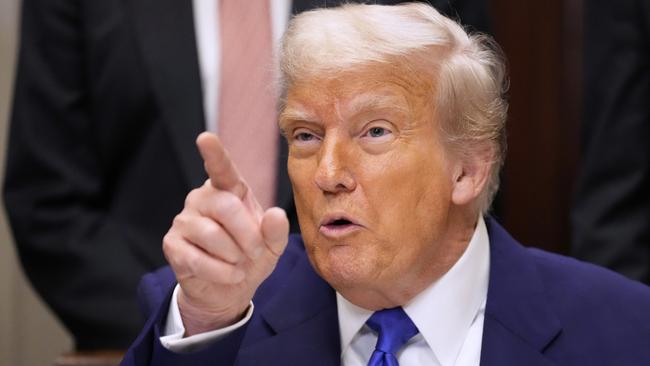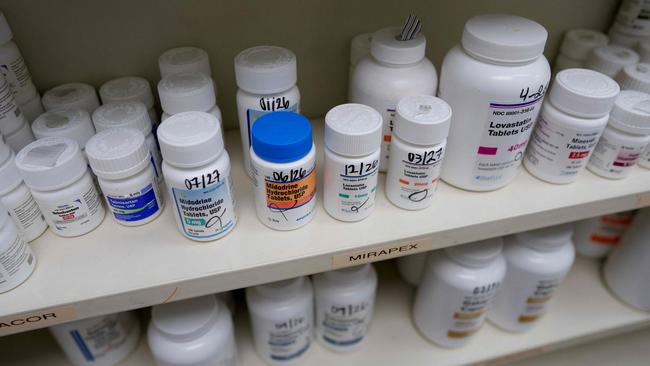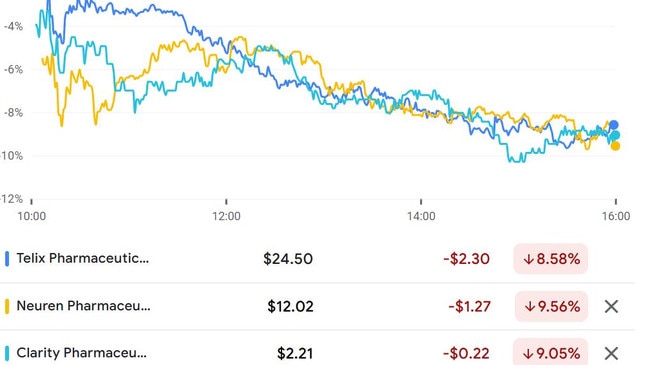Donald Trump’s latest executive order risks jacking up Australia’s drug prices
Donald Trump has signed an executive order described as a “game changer” which could hit Aussies harder than any of his previous moves.
Donald Trump has signed an executive order, described as a “game changer”, which could hit Australia harder than any of his other moves since taking office.
The US President claims his order will cut drug costs for American consumers, “almost immediately”, by up to 80 per cent.
It directs Health and Human Services Secretary Robert F. Kennedy Jr to have the government buy prescription drugs directly from the manufacturers at what Mr Trump is calling “the most-favoured nation price”.
What that means, in essence, is the US government will buy drugs at the lowest price they’re being purchased for in other countries.
Mr Trump is of the opinion that this will lead to lower prices in the United States, and that pharmaceutical companies will compensate by charging the rest of the world more. Hence the risk that drug prices will rise in Australia.
The President tried something similar during his first term in office, but was stymied by the courts. He then changed his mind during last year’s election campaign against Kamala Harris, slamming the idea as ineffective government overreach when she proposed it. And now he’s changed his mind again, recommitting to the policy.

MORE: Aussies to get $5k back amid US tariffs
“We are subsidising others’ healthcare, where they paid a small fraction of what we pay,” Mr Trump said today, at a White House event where he signed the executive order.
“Even though the United States is home to only 4 per cent of the world’s population, pharmaceutical companies make more than two-thirds of their profits in America.
“That’s not a good thing.”
Move will ‘hit most of the world’
“I will be instituting a MOST FAVORED NATION’S POLICY whereby the US will pay the same price as the Nation that pays the lowest price anywhere in the World,” Mr Trump wrote on social media yesterday.
“Our Country will finally be treated fairly, and our citizens’ Healthcare Costs will be reduced by numbers never even thought of before.

“On top of everything else, the United States will save TRILLIONS OF DOLLARS.”
Jared Mondschein, who is Director of Research at the US Studies Centre at the University of Sydney, said the move is set to impact all developing countries as pharmaceutical companies look to “balance out” their lost profits from the drop in US medication costs.
The federal government spent $17.7 billion on subsidising medicines in the 2023-2024 financial year.
Without a concession card, the maximum cost of a script in Australia for a drug under the Pharmaceutical Benefits Scheme is $31.60.
With a concession card, the maximum cost of a script is just $7.70.
As part of a budget measure, the Australian government released a PBS cap for pensioners and concession card holders, meaning that the $7.70 price would be frozen until June 31, 2029.
However, the government may be forced to increase the cost of medications for non-concession cardholders as pharmaceutical companies look to recoup their losses.

MORE: $115bn wiped: Trump’s rich listers hefty fall
“There is clearly a dynamic that the US feels that the US’ allies and partners are not paying their fair share. It’s a tough predicament,” Mr Mondschein said.
“It will affect most of the developed world, and it’s not like the US is angry with Australia and that’s in the crosshairs; it was just a matter of time.”
Mr Mondschein said that he was surprised it took Mr Trump more than 100 days to act on the issue; however, he believes the immediacy and timing of the policy is a way for the US President to gain a bit of favour back with the US people.
“I think anyone that says they’re surprised by Trump doing this was not paying attention,” Mr Mondschein said.
Sky News host Laura Jayes described the news as a “game changer” on Monday afternoon. And its impacts are already having a huge impact on Australia’s pharmaceutical industry, with ASX-listed companies crashing on Monday in fear of being forced to reduce their drug prices.

Neuren Pharmaceuticals, which sells drug therapies in the US, fell 9.6 per cent over the course of the day, the worst of any stock on the ASX 200 on Monday.
Aussie companies Clarity and Telix, which also sell in the US, fell more than eight per cent.
Beef production soars amid Trump tariffs
On the opposite end of the scale, Australia’s beef production soared to a record high in April despite US President Donald Trump singling out beef exporters during his reciprocal tariff speech.
New figures released by the Meat and Livestock Australia global supply analyst Tim Jackson shows Australian beef exports continued to rise last month.
According to the figures beef exports for the month of April came in at 127,172 tonnes, up 21 per cent compared to this time last year.
North America remained the largest market, with exports to the United States rising 37 per cent year-on-year to 37,213 tonnes and exports to Canada rising 40 per cent to 3.322 tonnes.
The MLA said the spike in sales in April follows a broader market trend, which started prior to the Trump administrations tariff announcement.
“The spike in April 2025 is part of a broader trend following a record-breaking 2024, where Australia exported 2.24 million tonnes of red meat to 104 countries, the highest volume ever recorded,” the MLA said in a statement to NewsWire.
“April’s volumes reflect this continued momentum supported by mature cattle and sheep herds leading to increased slaughter and supply as well as favourable global conditions and demand.”
-with NCA Newswire
Originally published as Donald Trump’s latest executive order risks jacking up Australia’s drug prices





